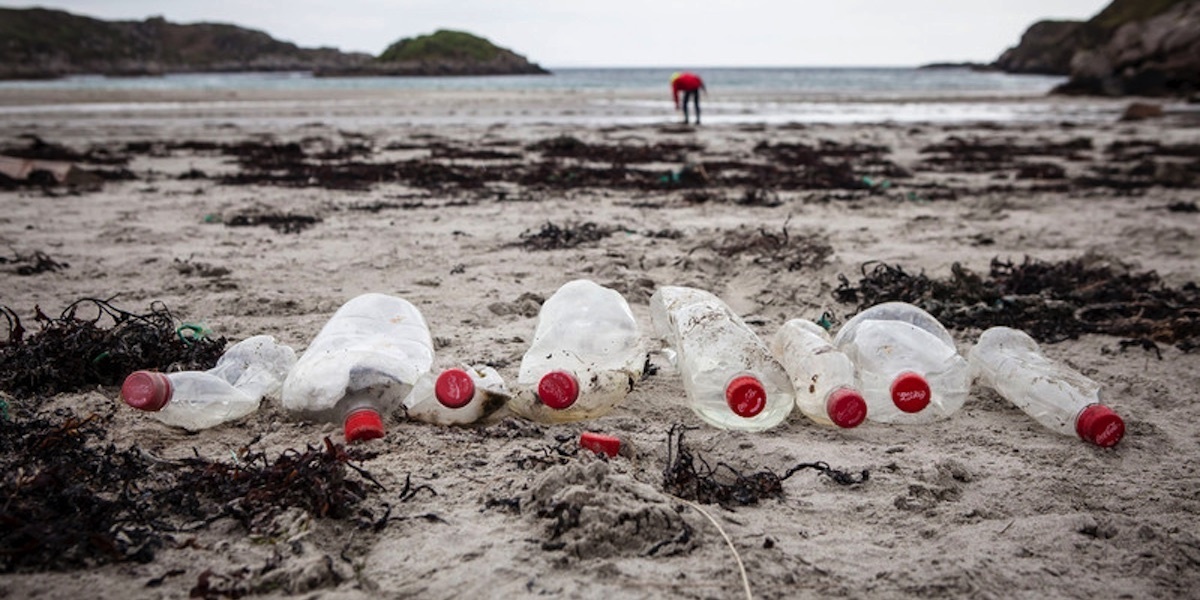

Coke bottles found on Mull Beach in Scotland. Will Rose / Greenpeace
Coca-Cola, PepsiCo and Nestlé were identified as the world’s biggest producers of
plastic trash in global cleanups and brand audits, a new report from Greenpeace and the Break Free From Plastic movement reveals.
Over the span of nine months, an international team of volunteers sorted through 187,000 pieces of plastic trash collected from 239 cleanups in 42 countries around the world.
The
results, released Tuesday, shows that these multinational food and beverage giants were the top 10 offenders:
- Coca-Cola
- PepsiCo
- Nestlé
- Danone
- Mondelez International
- Procter & Gamble
- Unilever
- Perfetti van Melle
- Mars Incorporated
- Colgate-Palmolive
BREAKING: @Coca-cola, @PepsiCo, and @Nestle have emerged as the top corporate polluters from 239 brand audits across 42 countries. Read the full report here → https://t.co/btb4SU8jen
— Greenpeace USA (@greenpeaceusa) October 9, 2018
#BreakFreeFromPlastic pic.twitter.com/CRfzEy8LRi
The organizers behind the effort are calling out these brands for their contribution to plastic pollution.
“These brand audits offer undeniable proof of the role that corporations play in perpetuating the global plastic pollution crisis,” Von Hernandez, global coordinator of Break Free From Plastic, said in a press release emailed to EcoWatch. “By continuing to churn out problematic and unrecyclable throwaway plastic packaging for their products, these companies are guilty of trashing the planet on a massive scale. It’s time they own up and stop shifting the blame to citizens for their wasteful and polluting products.”
Greenpeace Southeast Asia conducts plastic brand audit activity at Wonnapa beach, Chonburi province on World Cleanup Day, September 15, 2018.Greenpeace
In the U.S. specifically, a total of 70 cleanups determined that Nestlé, PepsiCo and Coca-Cola were the worst corporate plastic polluters, in that order.
The three companies have each pledged to cut their packaging waste. Coca-Cola has a global
goal to help collect and recycle the equivalent of 100 percent of its packaging by 2030. Nestlé aims to make 100 percent recyclable or reusable packaging by 2025. PepsiCo has a goal to design 100 percent of its packaging to be recyclable, compostable or biodegradable and to reduce its packaging’s carbon impact by 2025.
[instagram https://www.instagram.com/p/BoZcPL6B6_H/?taken-by=greenpeace expand=1]
Awareness about the global plastic waste crisis is growing worldwide. Governments around the world have taken steps to
ban single-use plastics and individuals are pledging to reduce their plastic footprint.
However, the organizers of the recent report are asking: Shouldn’t corporations that package their goods in plastics shoulder some of this responsibility, too?
“We all have a role to play in tackling plastic pollution. But the reality is, individual consumers are already bearing the burden of this crisis,” Greenpeace content editor Ryan Schleeter wrote in a blog post about today’s report. “We’re swapping plastic bottles for reusable glass and metal, ditching disposable straws, avoiding unnecessary packaging in our grocery stores, and cleaning up our beaches as best we can. But there’s only so much we can do if companies don’t step up and provide more sustainable choices.”
Plastic on Remote #SouthAtlantic Beaches Up 10 Fold in 10 Years #PlasticPollutes @plasticpollutes
— EcoWatch (@EcoWatch) October 9, 2018
https://t.co/ig6yeFf5at

 233k
233k  41k
41k  Subscribe
Subscribe 
